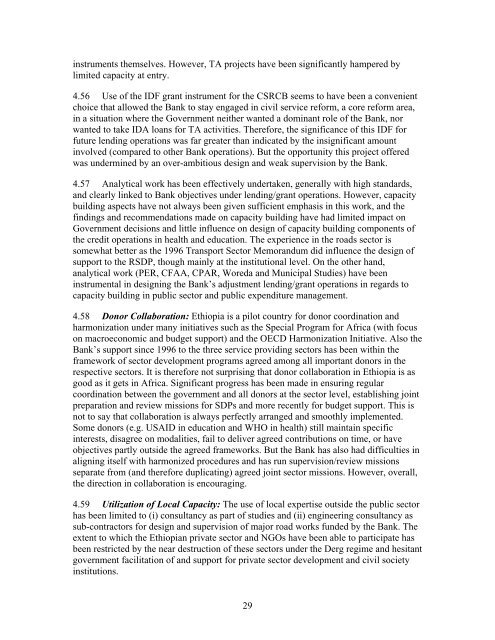An Independent Review of World Bank Support to ... - DAG Ethiopia
An Independent Review of World Bank Support to ... - DAG Ethiopia
An Independent Review of World Bank Support to ... - DAG Ethiopia
You also want an ePaper? Increase the reach of your titles
YUMPU automatically turns print PDFs into web optimized ePapers that Google loves.
instruments themselves. However, TA projects have been significantly hampered bylimited capacity at entry.4.56 Use <strong>of</strong> the IDF grant instrument for the CSRCB seems <strong>to</strong> have been a convenientchoice that allowed the <strong>Bank</strong> <strong>to</strong> stay engaged in civil service reform, a core reform area,in a situation where the Government neither wanted a dominant role <strong>of</strong> the <strong>Bank</strong>, norwanted <strong>to</strong> take IDA loans for TA activities. Therefore, the significance <strong>of</strong> this IDF forfuture lending operations was far greater than indicated by the insignificant amountinvolved (compared <strong>to</strong> other <strong>Bank</strong> operations). But the opportunity this project <strong>of</strong>feredwas undermined by an over-ambitious design and weak supervision by the <strong>Bank</strong>.4.57 <strong>An</strong>alytical work has been effectively undertaken, generally with high standards,and clearly linked <strong>to</strong> <strong>Bank</strong> objectives under lending/grant operations. However, capacitybuilding aspects have not always been given sufficient emphasis in this work, and thefindings and recommendations made on capacity building have had limited impact onGovernment decisions and little influence on design <strong>of</strong> capacity building components <strong>of</strong>the credit operations in health and education. The experience in the roads sec<strong>to</strong>r issomewhat better as the 1996 Transport Sec<strong>to</strong>r Memorandum did influence the design <strong>of</strong>support <strong>to</strong> the RSDP, though mainly at the institutional level. On the other hand,analytical work (PER, CFAA, CPAR, Woreda and Municipal Studies) have beeninstrumental in designing the <strong>Bank</strong>’s adjustment lending/grant operations in regards <strong>to</strong>capacity building in public sec<strong>to</strong>r and public expenditure management.4.58 Donor Collaboration: <strong>Ethiopia</strong> is a pilot country for donor coordination andharmonization under many initiatives such as the Special Program for Africa (with focuson macroeconomic and budget support) and the OECD Harmonization Initiative. Also the<strong>Bank</strong>’s support since 1996 <strong>to</strong> the three service providing sec<strong>to</strong>rs has been within theframework <strong>of</strong> sec<strong>to</strong>r development programs agreed among all important donors in therespective sec<strong>to</strong>rs. It is therefore not surprising that donor collaboration in <strong>Ethiopia</strong> is asgood as it gets in Africa. Significant progress has been made in ensuring regularcoordination between the government and all donors at the sec<strong>to</strong>r level, establishing jointpreparation and review missions for SDPs and more recently for budget support. This isnot <strong>to</strong> say that collaboration is always perfectly arranged and smoothly implemented.Some donors (e.g. USAID in education and WHO in health) still maintain specificinterests, disagree on modalities, fail <strong>to</strong> deliver agreed contributions on time, or haveobjectives partly outside the agreed frameworks. But the <strong>Bank</strong> has also had difficulties inaligning itself with harmonized procedures and has run supervision/review missionsseparate from (and therefore duplicating) agreed joint sec<strong>to</strong>r missions. However, overall,the direction in collaboration is encouraging.4.59 Utilization <strong>of</strong> Local Capacity: The use <strong>of</strong> local expertise outside the public sec<strong>to</strong>rhas been limited <strong>to</strong> (i) consultancy as part <strong>of</strong> studies and (ii) engineering consultancy assub-contrac<strong>to</strong>rs for design and supervision <strong>of</strong> major road works funded by the <strong>Bank</strong>. Theextent <strong>to</strong> which the <strong>Ethiopia</strong>n private sec<strong>to</strong>r and NGOs have been able <strong>to</strong> participate hasbeen restricted by the near destruction <strong>of</strong> these sec<strong>to</strong>rs under the Derg regime and hesitantgovernment facilitation <strong>of</strong> and support for private sec<strong>to</strong>r development and civil societyinstitutions.29
















